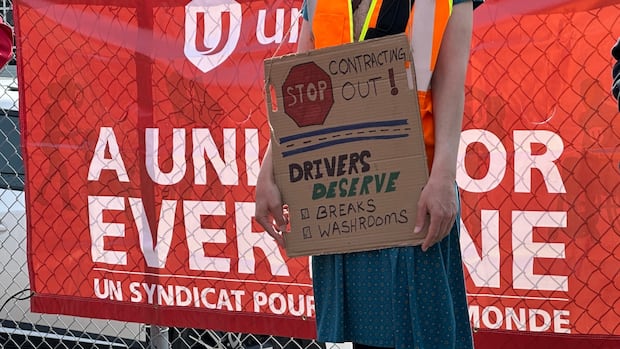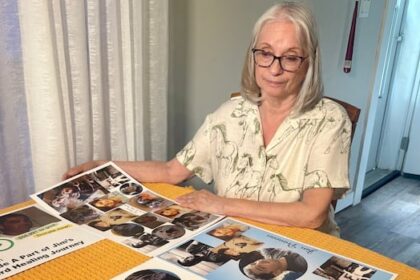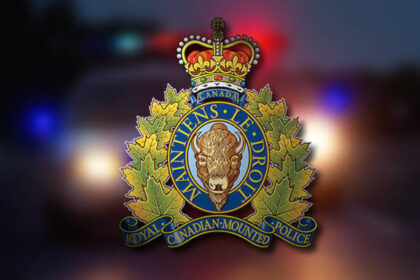British ColumbiaMore than six months into what is said to be the longest transit strike in B.C.’s history, the Cowichan Valley Regional District is asking the province to help resolve the dispute for the sake of locals, who are paying a steep price due to a lack of public transit.Transit strike now longest in B.C.’s history, union and CVRD sayEmily Fagan · CBC News · Posted: Aug 09, 2025 8:00 AM EDT | Last Updated: 7 hours agoA sign held by Michelle de Vries, a bus driver in the Cowichan Valley. (Kathryn Marlow/CBC)More than six months into what is believed to be the longest transit strike in B.C.’s history, the Cowichan Valley Regional District (CVRD) is asking the province to help resolve the dispute for the sake of locals, who are paying a steep price due to a lack of public transit.In a letter to B.C.’s Labour Minister Jennifer Whiteside on Friday, CVRD Board of Directors chair Kate Segall called for the province to “explore all appropriate means of supporting a resolution,” such as encouraging options like a voluntary cooling-off period or binding arbitration.”This labour dispute between B.C. Transit’s contractor – Transdev Canada – and their unionized employees is disproportionately impacting the most vulnerable people in our communities,” she said in a statement.Examples of the hardship, as described by the CVRD, include a family with seven children in the isolated community of Honeymoon Bay, with no transportation to access health care for their serious health conditions.Then there’s the Shawnigan lake family facing high travel costs to commute to adult education and apprenticeship programs, putting their professional development at risk, says the district.WATCH | The parties involved in long-running transit dispute: Who’s behind the wheel of Vancouver Island’s transit challenges?Bus service continues to be a challenge for some Vancouver Island commuters. Transit drivers in the Cowichan Valley have been on strike for nearly five months, making it one of the longest transit strikes in B.C. history. The CBC’s Kathryn Marlow reports on the issues passengers are facing, and who is involved in the transit operations. People have also messaged the CVRD to share that they’ve lost jobs, faced barriers to accessing food security programs, struggled with isolation, and taken on the risk of hitchhiking since the strike began in February.Segall says B.C.’s “leadership and influence” could help bring Transdev and Unifor, the union representing the transit workers, closer to an agreement.The Cowichan Valley Regional District is calling on Jennifer Whiteside, B.C.’s minister of labour, to help end the six-month transit strike. (Ben Nelms/CBC)Minister Whiteside was not available for an interview with CBC News on Friday. In a statement, the Ministry of Labour said it is reviewing the situation to determine how to support a resolution.Transit workers voted on Aug. 7. to reject a proposed binding-arbitration process, following a vote in July to reject recommendations from a provincially appointed mediator to resolve the strike. The union members also voted against a potential deal in April.Transdev’s senior vice president for western Canada, Emily Watson, expressed disappointment in the decision to reject the arbitration process. “Transdev and Unifor representatives mutually agreed to an arbitrator and binding arbitration dates that would have seen a return-to-work plan commence immediately and a full resumption of service in late August,” she said in a statement. “The fact that it has been rejected by union members on August 7th, along with the previous mediator’s recommendations, is a disservice to the community.”Members of Unifor locals 333 and 114 at a rally in Victoria, B.C. on April 14, 2025. The locals, which represent bus and HandyDART workers in the Cowichan Valley, have been on strike since Feb. 8, 2025. (Kathryn Marlow/CBC)Union wants help from municipalitiesGavin Davies, a national representative for Unifor, said members were concerned that arbitration would not address the root cause of their concerns around wages, bathroom access, and bathroom breaks. “One of their fears is, we’ve been out on strike for six months, [if] we go back to work with no commitment to address these issues then we’re back out on strike in a year-and-a-half from now,” said Davies, who said workers have lost half a year’s wages for the job action.To end the strike, Davies says some of the issues go beyond what Transdev is able to address. Transit workers want to see commitments from the CVRD, B.C. Transit, and municipalities to meet with the union and Transdev in order to work on a resolution to the issues around bathroom access and breaks, he said.When asked if he sees an end in sight for the strike, Davies said, “not until these parties step up to the plate.”He says that drivers are aware of the impact this strike has had on the community, with some coming to tears over it.”We truly are sorry for the hardship – and sorry doesn’t cut it to somebody who’s lost their job or can’t get to the grocery store, can’t pick up their medications,” Davies said. “I know that sorry falls far short, but it’s the only thing that we can say.”Segall, North Cowichan Mayor Rob Douglas, and Duncan Mayor Michelle Staples were not available to comment on whether they would commit to meeting with the union and Transdev to help resolve the strike.A B.C. Transit bus is pictured in a file photo from the Queensway Exchange, in Kelowna B.C. (Tom Popyk/CBC)B.C. Transit spokesperson Jamie Weiss said in a statement that while street infrastructure is the responsibility of local governments, it has worked to jointly fund and build washrooms for transit employees in several other communities. “With regards to washroom access for Operators in the Cowichan Valley, B.C. Transit has engaged with Transdev Canada, our local government partners and others in the past to support a resolution,” he wrote. “B.C. Transit will not interfere with the collective bargaining process, but our organization will continue to support ongoing communications around this issue.”ABOUT THE AUTHOREmily Fagan is a journalist based in Victoria, B.C. She was previously a staff reporter for the Toronto Star. Her work has also appeared in publications including the Globe and Mail, Vice, and the Washington Post. You can send her tips at emily.fagan@cbc.ca.
Cowichan regional district urges B.C. to intervene on 6-month transit strike, citing toll on most vulnerable











